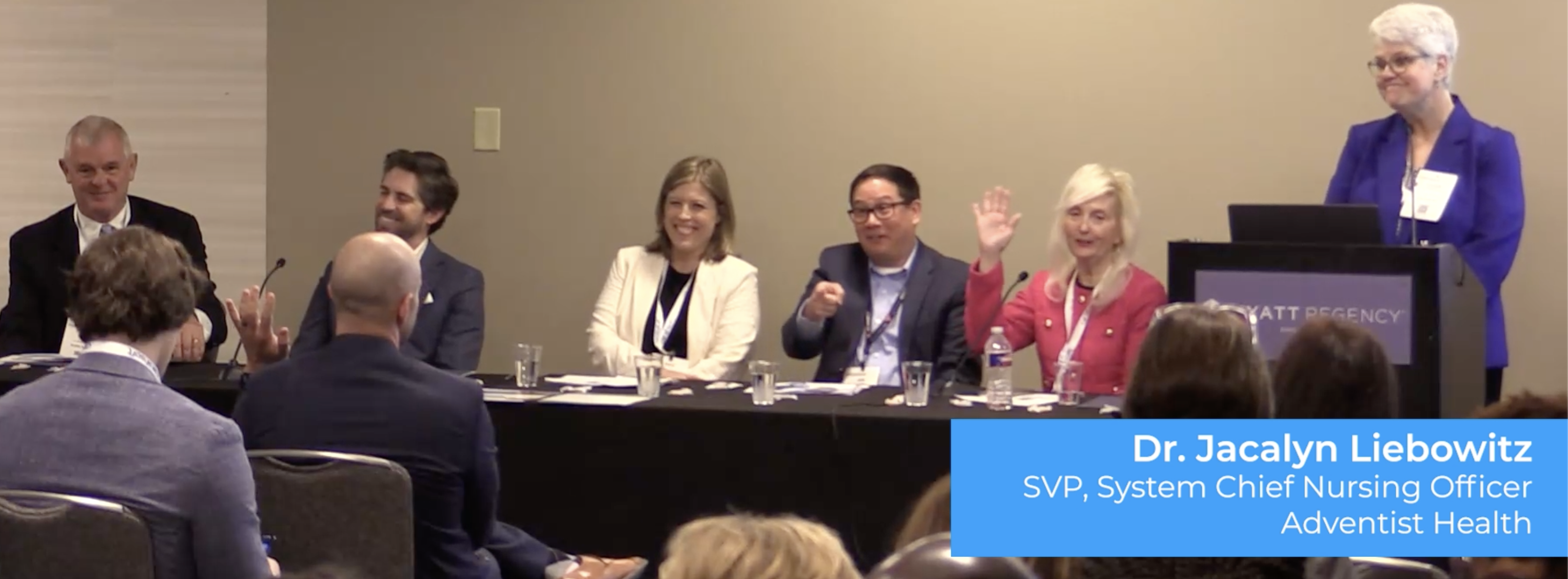Long term, is it realistic to get rid of all of your agency nurses? Jacalyn Liebowitz of Adventist Health doesn’t think so. Watch as she explains why “agency is AN answer, but it’s not the only answer.”
Full text, edited for clarity:
Q: Dr. Liebowitz, as a System Chief Nursing Officer, what was your strategy for helping the rest of the organization see staffing differently?
A: How many of you have said this as you’re looking at your financial performance of your organization, “let’s get rid of all agency?” That’s not realistic.
You can probably hit that for certain periods of time, but when you think about your staffing, you have your core full-time staff, a component of part-time staff, a component of contingency or float pool, and then you have agency.
Agency is going to fill that void when you have an unexpected leave, or when you’re having to quickly open a program or quickly close a program. It gives you that flexibility. We had to grapple with accepting that we’re never going to get to zero agency. That’s not realistic on a long-term basis. Having that conversation at the system level was critical.
The other thing was really to be able to look at how we managed agency appropriately. So, if we’re not going to get rid of it, how do we manage it in a way that is best for us? How do we control the dollars that we’re paying. We can set how much we want to pay for a role and then have the flexibility to increase the rate if we are not getting a fill.
We’ve put limits on how much we will pay for certain roles, and we have an appeal process for that. Most recently, we’ve put in constraints on the number of times we will refill an agency role. How many of you have agency workers who are like your own staff because they’ve been there for so many consecutive contracts? It’s nice to have that level of assurance and quality, but what we came to realize is that we were just basically promoting the ability for them to stay continuous agency.
We’ve set a cap; we won’t let an agency role continue for more than three consecutive contracts. Beyond that, we will refill with someone from agency if we have to, but we’re not building in that comfort level that the person’s going to stay with us forever, get paid at that level and be able to have greater flexibility. So that was a big thing for us to be able to work through.
Another thing that we said is we’re only going to pay a certain level for each of our areas. MedSurg, we are only paying so much, Critical Care, whatever the specialty is; that allowed us to cap. And again, we created a dynamic group and had a weekly appeal process where, if you felt you need to go higher than that, we would review the data quickly to be able to say, should we go above the cap?
One of the things we created about a year and a half ago was a half-hour huddle with the system CFO, the system COO, the Chief Human Resources Officer, myself, Joe (Program Manager) and Melissa (System Director), and we went through our data.
What used to happen, and you’ve probably experienced this, at the end of a month, the CFO would get the financials and go, “Rrr. Look at this agency”, right? We have this massive agency spend. We knew it was coming. So, by doing this, we look at how many agency we are adding or taking off every single week.
The CFO has the ability to look at that information at a system level or by facility level any time they want, but we routinely look at it every single week to forecast where we’re going to be from an agency perspective.
That helps us see what we could do in subsequent weeks so that we can be a little bit more proactive rather than just reactive at the end of the month. That was really critical for us to put together, so they had this knowledge of what was coming through.
Another thing that was essential in that conversation is we added another HR executive as well as Talent Acquisition to that huddle. If we’re struggling in an area, how are we going to redeploy resources to perhaps start filling some of those roles so we can get out of that “agency as the only answer”? Agency is an answer, it’s not the only answer. It needs to be part of the entirety of the solution.
Now remember, we’re West-Coast-based, so our hourly staff costs are higher than those of you who live in the middle to the East part of the country, and it’s variable everywhere, I understand. But we were able to compare what we were paying our agency staff to the all-in costs for our staff with benefits, to be able to say, “Hey, you know what, we’re beating up the CEOs and the CFOs about why you have this agency person and guess what? They were at the same rate or sometimes cheaper than our own staff.” So, let’s start going for the ones that really are higher rates and that’s exactly what we did.
We took from those MSP dollars, besides funding the staffing to run our own MSP, to create our transition and practice programs for those higher specialty areas that would be more costly.
We also developed our MSP to be able to support our residency program so we can retain staff better and have less churn on our new staff. We were able to fund a couple of these programmatic things. So, for me, as I look at what we did, I wish we would have done that huddle way up front so we would have had buy-in and understanding what we were expending and how we were doing it. I would have involved Talent Acquisition much sooner. And I think we should have gotten to some of those parameters that we set up much faster. Because, I think, it would have given us even greater control of this program than what we had to start out with.
Panelists:
- Jacalyn Liebowitz, DNP, MBA, RN, FACHE, NEA-BC. SVP, System Chief Nursing Officer, Adventist Health
- Jeff Mock, MBA, Chief Financial Officer, North Cost Network, Adventist Health
- Melissa Hosey, MSN, RN, NP-C, System Director, Clinical Workforce, Adventist Health
- Joe Heilman, Program Manager of the Agency Staffing Office, Adventist Health
- Timothy Teague, President, BlueSky Synergy
- Ellen Verhaagen, Moderator, BlueSky Synergy



